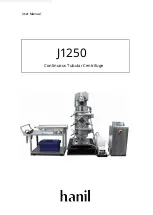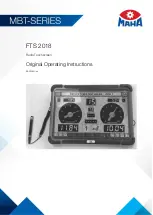
24
Operating Instructions
MAXIMIZING STABILITY
Follow the ensuing procedures to achieve maximum stability with your grain cart:
Operating in field
a. Fully extend the axles
b. Ensure brakes are properly connected to tractor
Operating on road
a. Empty the contents of the grain cart
b. Fully retract the axles
c. Move auger to transport position
d. Ensure brakes are properly connected to tractor
Grain Cart is stationary and unhooked from the tractor
a. Empty the contents of the grain cart
b. Fully retract the axles
c. Ensure that parking brake is applied
d. Move auger to storage position
e. Lower the jack
f. Apply the wheel chocks
• If parked on a slope, place each chock on the downhill faces of the two tires.
• When parked on level ground, the chocks should be placed on both sides of the auger side wheel to prevent any
rocking motion that might send the grain cart in one direction or another.
WARNING:
For greater stability on uneven or steep terrain, position non-scale wheel spindles at the furthest out setting.
1) Connect grain cart hitch to tractor drawbar using a good quality hitch pin. Attach the safety chain to the tractor and around
the A-frame of the cart. Make sure the grain cart hitch properly matches the hitch of the tractor. Use a single prong (spade)
grain cart hitch with a tractor double prong (clevis) hitch. Use a double prong (clevis) grain cart hitch with a single prong
(spade) tractor hitch. Use a K80 spoon grain cart hitch with a K80 ball tractor hitch.
Safety Chains User Instruction
a. Secure the safety chains by looping them around each side of the grain cart and connecting to the towing machine’s
attaching bar.
b.
Do not allow any more slack than necessary for articulation (maximum 28 cm, 11”)
c. Do not use any intermediate support as the attaching point.
d. Store the safety chain by securing it around the main axle A-frame of the grain cart. Replace the safety chains if one or
more links or end fittings are broken, stretched, damaged, or deformed.
2) Attach the power take-off shaft to the tractor. The PTO must have at least 25,4 cm (10”) of engagement. Check tractor
drawbar for clearance and length and adjust if necessary.
Make sure the PTO does not bottom out when making sharp
turns as it may bend the drive shaft.
3) Make sure the jack stand is removed from the lower support position before the cart is moved.
Never use the jack to
support a loaded grain cart.
4) Be sure that no debris or foreign objects are in the grain cart.
5) Attach the hydraulic lines to the tractor. Two hydraulic lines (green band) operate the inside gate mechanism. Connect
these lines to one service outlet on the tractor. Two hydraulic lines (yellow band) operate the folding mechanism of the auger.
Connect these lines to a second service outlet on the tractor. Two hydraulic lines (red band) operate the hydraulic flow control
spout located at the end of the upper auger. Connect these lines to a third service outlet on the tractor. The remaining two
hydraulic lines operate the adjustable axle. Connect these lines to a fourth service outlet on the tractor. Make sure the air is
bled from the hydraulic cylinders and hoses.
CAUTION:
Before operating hydraulic components, verify a clear working area. If the ladder is in the out position, the
operator must check inside the tank to ensure nobody is inside before operation.
6) Attach the air brake lines to the tractor and release the park brake.
7) Connect the lighting 7-prong connector end on the main wiring harness to the tractor electrical outlet. Make sure that all
flasher and turn indicator lights are working properly before incidental highway travel.
















































